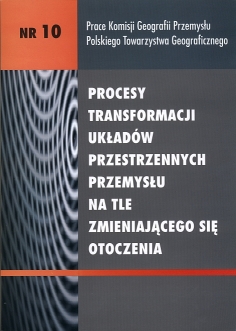Bezpieczeństwo energetyczne Polski
DOI:
https://doi.org/10.24917/20801653.10.8Słowa kluczowe:
bezpieczeństwo, energetyka, PolskaAbstrakt
The energy security is the term for the most part identified with ensuring its availability to different energy carriers and taking care about the continuity of its delivery. According to the authors, for Poland it means - above all - the diversification of the geographical structure of supply sources of crude oil and natural gas.The first part of the paper shows Polish dependence on the import of Russian crude oil and the possible other sources of supply - by realization of the plans of constructing the Odessa-Brody oil pipeline to Płock or using „Naftoport” in Gdańsk for oil unloading. The next part presents problems of the diversification of supply sources of natural gas and propositions alternative to the import from Russia - the delivery of natural gas from Norway or using the supply of liquefied gas (LNG) by sea (which requires infrastructure). In the last part of the paper the main subject is the role of the Polish petrochemical concern, PKN ORLEN in the country’s energy security system.The biggest corporation of Central Europe gained its importance on its own and taken-over refineries in Poland, the Czech Republic and Lithuania, also taking over inefficient logistic infrastructure, storage depots, pipeline network and sea reloading possibilities in Poland and Lithuania. The company interpreted the delivery diversification as the increased number of the crude oil suppliers and limitation of the share of long-standing contracts in the structure of crude oil delivery and the development of its own extraction segment. The authors recapitulate by saying that the idea of energy security and diversification can have different rendition in enterprises and the government. The diversification of the deliveries is possible but can be expensive (more expensive fuels, higher costs of transport, changes in processing technology), which can be a problem to enterprises. Doubts can be raised on the direction of the country’s actions, and promoting companies creating their own fuel base (it is more expensive than other solutions); it cannot be forgotten that Polish refineries have a right to negotiate the prices of crude oil delivery, which can maximise the gain for share holders (including the Treasure Ministry). The best solution to the problem of the level of energy security would be (besides diversification of sources of supply) a constant increase in crude oil storage capacity and system storage of natural gas.Downloads
Download data is not yet available.
Bibliografia
Diakonowicz M., 2005, Droga do megakoncernu, „Nafta & Gaz Biznes”.
Gądek Ł., Słowiński W., 2006, Logistyka dostaw a bezpieczeństwo energetyczne, „Chemical Review”, I.
Mały Rocznik Statystyczny 2006, GUS, Warszawa
Polityka energetyczna Polski do 2025 r., M.P. z dnia 22.07.2005
www.orlen.pl
www.pgnig.pl
www.pwc.com
www.rynekgazu.pl
www.szczesniak.pl
www.wnp.pl
Pobrania
Opublikowane
2008-01-01
Jak cytować
Wieloński, A., & Machowski, J. (2008). Bezpieczeństwo energetyczne Polski. Prace Komisji Geografii Przemysłu Polskiego Towarzystwa Geograficznego, 10, 86–92. https://doi.org/10.24917/20801653.10.8
Numer
Dział
Artykuły
Licencja
Artykuły publikowane są zgodnie z warunkami licencji Creative Commons (CC BY-ND 4.0; uznanie autorstwa-bez utworów zależnych).

